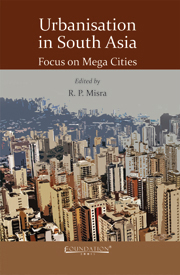Book contents
- Frontmatter
- Contents
- List of Figures
- List of Tables
- List of Contributors
- Introdution
- 1 South Asia: Land, People, and Economy
- 2 Historical Roots of South Asian Urbanisation
- 3 Mumbai: The Financial Capital of India
- 4 Delhi: Growing Problems of a Growing Megalopolis
- 5 Calcutta: The Emergence of Colonial Settlement into Megacity of the East
- 6 Chennai: A Rural Metropolis in Search of Modernity
- 7 Hyderabad: From the Feudal City to a Hi-Tech Metropolis
- 8 Bangalore: From Garden City to Silicon Valley of India
- 9 Karachi: The Commercial Capital of Pakistan
- 10 Lahore: The Cultural Heart of Pakistan
- 11 Kabul: A City in Perpetual Turmoil
- 12 Dhaka: A Mega City of Persistence and Change
- 13 Kathmandu: A City Where Tradition and Modernity Overwhelm Each Other
- 14 Thimphu: The City of Peace and Organic Development
- 15 Colombo: The Primate City of Sri Lanka
- 16 Male: Island Capital of an Island Nation
- 17 Beyond the Present: Vision of a New Urban Future
- Index
17 - Beyond the Present: Vision of a New Urban Future
Published online by Cambridge University Press: 05 September 2013
- Frontmatter
- Contents
- List of Figures
- List of Tables
- List of Contributors
- Introdution
- 1 South Asia: Land, People, and Economy
- 2 Historical Roots of South Asian Urbanisation
- 3 Mumbai: The Financial Capital of India
- 4 Delhi: Growing Problems of a Growing Megalopolis
- 5 Calcutta: The Emergence of Colonial Settlement into Megacity of the East
- 6 Chennai: A Rural Metropolis in Search of Modernity
- 7 Hyderabad: From the Feudal City to a Hi-Tech Metropolis
- 8 Bangalore: From Garden City to Silicon Valley of India
- 9 Karachi: The Commercial Capital of Pakistan
- 10 Lahore: The Cultural Heart of Pakistan
- 11 Kabul: A City in Perpetual Turmoil
- 12 Dhaka: A Mega City of Persistence and Change
- 13 Kathmandu: A City Where Tradition and Modernity Overwhelm Each Other
- 14 Thimphu: The City of Peace and Organic Development
- 15 Colombo: The Primate City of Sri Lanka
- 16 Male: Island Capital of an Island Nation
- 17 Beyond the Present: Vision of a New Urban Future
- Index
Summary
South Asia is now part of the global capital and information system; economic structural reforms since the early 1990s aim at further strengthening its bonds with the global economy. Many economists and urban planners feel that the mega cities are the engines of growth and the future of the national economies of the region depends on them. As such, the macro-economic reforms to meet the imperatives of globalisation have been accompanied with urban sector reforms to increase productivity and attractiveness of large cities.
The shift from mixed economy, with its commanding heights controlled by the public sector, to globalisation, liberalisation, and privatisation in 1990s has neither been smooth nor painless. Rapid economic growth and technological progress are accompanied by interpersonal and inter-regional inequities, environmental degradation, and cultural debasement. While the number of billionaires and millionaires in on the increase, the number of those who are below the poverty line as also those dying of hunger is not decreasing fast enough to give hope for a better and more peaceful future. Global warming and climate change is another unwanted and unexpected outcome of the new economic policy. To add to the problems, the basic human values that make us better human beings are getting eroded as pursuit of material advancement gains momentum. How to find a mid-way that improves the quality of life of all is a major challenge South Asia faces today as it tries to integrate itself in the global economy?
- Type
- Chapter
- Information
- Urbanisation in South AsiaFocus on Mega Cities, pp. 458 - 490Publisher: Foundation BooksPrint publication year: 2012



